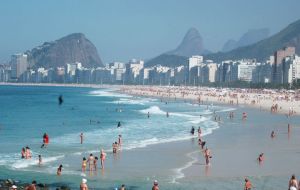MercoPress. South Atlantic News Agency
Brazil readies 14.000 troops in case Rio do Janeiro police strike extends
 The beaches of the ‘marvellous city’ unprotected
The beaches of the ‘marvellous city’ unprotected Brazil prepared to deploy troops on the streets of Rio de Janeiro on Friday, as a strike by the state's police force threatened to disrupt upcoming carnival festivities and raised new questions about security before the 2014 World Cup.
The strike, for higher wages, began early Friday and follows an ongoing walkout by police in the north-eastern state of Bahia. There, police stopped work on January 31, unleashing a crime wave with more than 150 homicides, looting, and vandalism mostly concentrated in the capital city of Salvador.
In Rio, the police job action is not expected to cause similar chaos because strike leaders agreed to a minimum level of service despite the protests.
However, the willingness of Brazil's police to stage walkouts when they are most needed has unsettled many and called into question the overall state of preparedness in a country with increasing first-world ambitions.
As residents went about their business on Friday in the seaside city of 6.4 million people, only a handful of precincts appeared to struggle with a shortage of officers. Still, authorities were ready with emergency plans that could deploy more than 14,000 federal troops across the city and the surrounding state of the same name.
President Dilma Rousseff last week deployed more than 4,000 troops to Salvador to try to restore order. Given a growing call for walkouts nationwide by police officers demanding higher salaries, state and federal officials prepared for similar measures in Rio.
“There is a contingency plan,” said Colonel Frederico Caldas, a spokesman for the police force. “But it isn't necessary with the current situation.”
The strike comes just one week before Rio's famous carnival celebrations and coincides with the start of hundreds of informal street parades, known as blocos. As many as 850,000 tourists are expected to hit the beaches and palm-tree lined promenades of Brazil's second-biggest city for the festivities, which officially start on February 17 and end on February 22.
The walkout also renews concerns that Brazil, eager to show off its growing prosperity during the World Cup two years from now, is ill-equipped to provide the security needed in the 12 cities selected as venues for the soccer games, including Rio and Salvador. Rio will also play host to the 2016 Olympics.
Out of Rio's 70.000-strong force which also includes firemen and state prison guards, only about 3.000 assembled in the city's colonial centre late Thursday in an initial protest to launch the strike.
Though Rio's state assembly voted to raise the force's wages by 13%, with an additional increase next year, strikers are pushing for more.
State police, charged with day-to-day security in Brazil, earn far less than most private-sector workers and many other civil servants, too. In Rio, the pay raise would give police a minimum monthly wage of 1.816 Brazilian Reais, about half what the police are demanding.




Top Comments
Disclaimer & comment rulesCommenting for this story is now closed.
If you have a Facebook account, become a fan and comment on our Facebook Page!